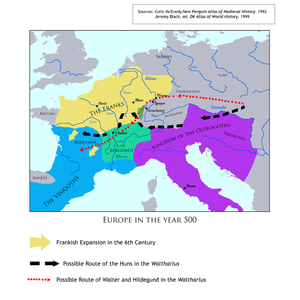Waltharius513
Revision as of 20:20, 10 December 2009 by Michelle De Groot (talk | contribs) (→Gunther and his companions approach Walther’s camp; Hagen unsuccessfully tries to dissuade the king from attacking it (513–531))
Gunther and his companions approach Walther’s camp; Hagen unsuccessfully tries to dissuade the king from attacking it (513–531)
| Ast ubi Guntharius vestigia pulvere vidit, | Georgics 3.171: summo vestigia pulvere signent. ‘Let them print their tracks on the surface of the dust.’ Statius, Thebaid 6.640: raraque non fracto vestigia pulvere pendent. ‘The rare footsteps hover and leave the dust unbroken.’
|
DDSDDS | ||||
| Cornipedem rapidum saevis calcaribus urget, | Prudentius, Psychomachia 253-254.: talia vociferans rapidum calcaribus urget/ cornipedem. ‘Thus exclaiming she spurs on her swift charger and flies wildling along with loose rein.’ Statius, Thebaid 11.452-453.: saevis calcaribus urgent/ immeritos. ‘With savage goads they incite their innocent teams.’
|
DDSSDS | Cornipedem: horse (literally, horn-foot). The hoof was considered to be made of horn similar to the material of an antler. Cato (TK) and Virgil (Georgics 3.88) both use the word of hooves; interestingly, in was also applied to birds' beaks, warts, and even, according to Pliny, skin over the eye. MCD | |||
| Exultansque animis frustra sic fatur ad auras: | 515 | Aeineid 2.386: exultans animisque. . . ‘Flushed with courage. . .’ 11.491: exsultateque animis. ‘He exults in courage.’ 11.556: ita ad aethera fatur. ‘He cries thus to the heavens.’
|
SDSSDS Elision: exultansque animis |
|||
| Accelerate, viri, iam nunc capietis euntem, | DDSDDS | |||||
| Numquam hodie effugiet, furata talenta relinquet.' | Furata: passive in sense, though from a deponent.
|
Eclogue 3.49: numquam hodie effugies. ‘This time you won’t get away!’
|
DDSDDS Elision: H-ELISION: numquam hodie; hodie effugit |
|||
| Inclitus at Hagano contra mox reddidit ista: | DDSSDS | |||||
| Unum dico tibi, regum fortissime, tantum: | SDSSDS | |||||
| Si totiens tu Waltharium pugnasse videres | 520 | Videres equiv. to vidisses
|
DSDSDS | |||
| Atque nova totiens, quotiens ego, caede furentem, | Aeineid 2.499-500.: vidi ipse furentem/ caede Neoptolemum. ‘I myself saw Neoptolemus, mad with slaughter.’ 8.695: arva nova Neptunia caede rubescunt. Neptune’s fields redden with strange slaughter.’ 10.514-515.: te, Turne, superbum/ caede nova. . . ‘You, Turnus, still flushed with fresh slaughter. . .’
|
DDDDDS | ||||
| Numquam tam facile spoliandum forte putares. | SDDSDS | |||||
| Vidi Pannonias acies, cum bella cierent | Aeineid 1.541: bella cient. ‘They stir up wars.’ Statius, Thebaid 11.487: cum bella cieret. . . ‘When he made war. . .’
|
SDDSDS | ||||
| Contra Aquilonares sive Australes regiones: | Aquilonares equiv. to Aquilonias
|
DSSSDS Elision: contra Aquilonares; sive Australes |
Since the beginning of the poem is spent establishing that all of western Europe fears the Huns, Hagan's assertion that he is greater than them carries considerable weight. MCD | |||
| Illic Waltharius propria virtute coruscus | 525 | SDDSDS | Recurrence of "coruscus" emphasizes Walther's fame. | |||
| Hostibus invisus, sociis mirandus obibat: | Aeineid 6.167: lituo pugnas insignis obibat et hasta. ‘He braved the fray, glorious for clarion and spear alike.’
|
DSDSDS | ||||
| Quisquis ei congressus erat, mox Tartara vidit. | Aeineid 6.134-135.: bis nigra videre/ Tartara. . . ‘Twice to see black Tartarus. . .’
|
DSDSDS | The Waltharius-poet uses a Virgilian formula here, which may be significant in the effort to place the poem's religious loyalties. Though little is known specifically of continental Germanic paganism, it is generally assumed to bear some similarity to Scandinavian cults, since related tribes colonized the areas during the period of migration following the Fall of Rome. According to what is known of Scandinavian beliefs, a warrior who fell in battle might hope that his soul would fly to Valhalla, a feasting hall in the realm of the gods, where great warriors awaited the final battle, Ragnarok, at the end of the world. Those who died of sickness or accident traveled instead to Hel, in an underworld which resembles Roman Tartarus or Christian Hell much more closely than Valhalla. A warrior who died in battle with Walther, according to such a belief system, was much more fortunate than one who died safe in his bed. There is little trace of such an ethos in Hagan's warning, however; he treats death as a fate to be avoided. In this sense, Gunther's mockery of Hagan's caution perhaps is justified in terms of Germanic religion; that Gunther's world-view is clearly denigrated, however, suggests that the Waltharius-poet wishes to associate all death with the darkness of Hel, stripping it of any (pagan) glory. For a further discussion of Germanic religion, see Rudolf Simek's chapter in Early Germanic Literature and Culture,ed. Brian Murdoch and Malcolm Read (2004). | |||
| O rex et comites, experto credite, quantus | : Aeineid 11.283-284.: experto credite quantus/ in clipeum adsurgat, quo turbine torqueat hastam. ‘Trust one who has experienced it, how huge he looms above his shield, with what whirlwind he hurls his spear.’
|
SDSSDS | ||||
| In clipeum surgat, quo turbine torqueat hastam.' | : Aeineid 11.283-284.: experto credite quantus/ in clipeum adsurgat, quo turbine torqueat hastam. ‘Trust one who has experienced it, how huge he looms above his shield, with what whirlwind he hurls his spear.’
|
DSSDDS | TK | |||
| Sed dum Guntharius male sana mente gravatus | 530 | Aeineid 4.8: male sana. . . ‘Much distraught. . .’
|
SDDSDS | |||
| Nequaquam flecti posset, castris propriabant. | Propiabant equiv. to appropinquabant
|
SSSSDS |
